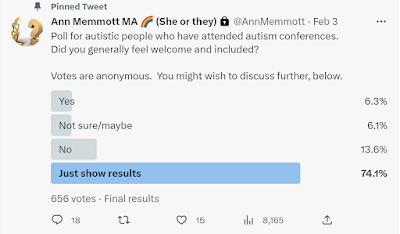In a recent autism news article, an academic is reported to have said that autism researchers at a conference were very relieved that few autistic advocates were at the event. Apparently, the nonautistic researchers were comforted to know that if they said derogatory things about autistic people, they wouldn't be facing serious consequences.
It led to me asking autistic people about their experiences at autism conferences, in an informal poll.
This is the result.
Of the autistic people who saw the informal poll on my page, only a quarter said they generally felt welcome and included at autism conferences.
It gives us some questions, doesn't it.
If it is in any way representative of autistic conference attendees/speakers generally, what might that say about autism conferences?
Who are the conferences for?
I've been to a few good ones, for sure. I am thankful for allies and autistic teams who work hard and tirelessly to get things as right as possible. People who include proper information at the start. People who put up good, thoughtful access statements, working with autistic specialists. People who are aware of the need to communicate in writing, sign and speech, etc. People who think about quiet rooms, and clear information on the day. About pacing and how to feed back in ways that allow for thought. People who understand intersectionality and are aware how many autistic people also have other neurodiversities, disabilities or situations in life that means trekking endless miles and paying £500+ to attend is totally beyond their reach.
I looked at some of the recent research on autistic people (2022) from people who speak at conferences. Too much of it was filled with dehumanising language. Autistic people, including of course our research colleagues, are described variously as disordered, deficient, as having 'aberrant' brain connections. The narrative was endless. The research teams wanted cures for our 'behaviour' and treatments for our 'restricted interests'. Genetic alterations were suggested to make us the sort of people they assumed we wanted to be, without asking us.
Are conferences for nonautistic researchers, so they can continue to describe our loved autistic people in too-often negative terms, unbothered by challenge from those who have to live with the consequences? Those who have to face employers who are told we are Deficient and Disordered? Those who face having their children taken away from them if they dare disclose that they are an autistic parent? Those who face a life of fairly continual discrimination from a society fed this story about us, without us? Those who are fellow researchers, afraid to ever say they are autistic, because of the stigma?
There are very good research challenges to that negativity. Teams of autistic people and allies who are pushing hard against 'deficiency' narratives. Teams who are pointing to the growing research focusing on a more balanced and fair set of perspectives. Teams upholding the voices of autistic people of all kinds and all backgrounds, who want to be heard.
Autistic people don't want to be outside, being given an update on which awful words were used to describe us in the halls of power. Waiting to find out what fate our alleged superiors have in store for us.
These are our lives. Our families. Our futures.
It's not good enough that only a quarter of autistic people in this survey felt welcomed and included in the very conferences alleging to make a difference to our lives.
We must do better.
Thank you for reading.

